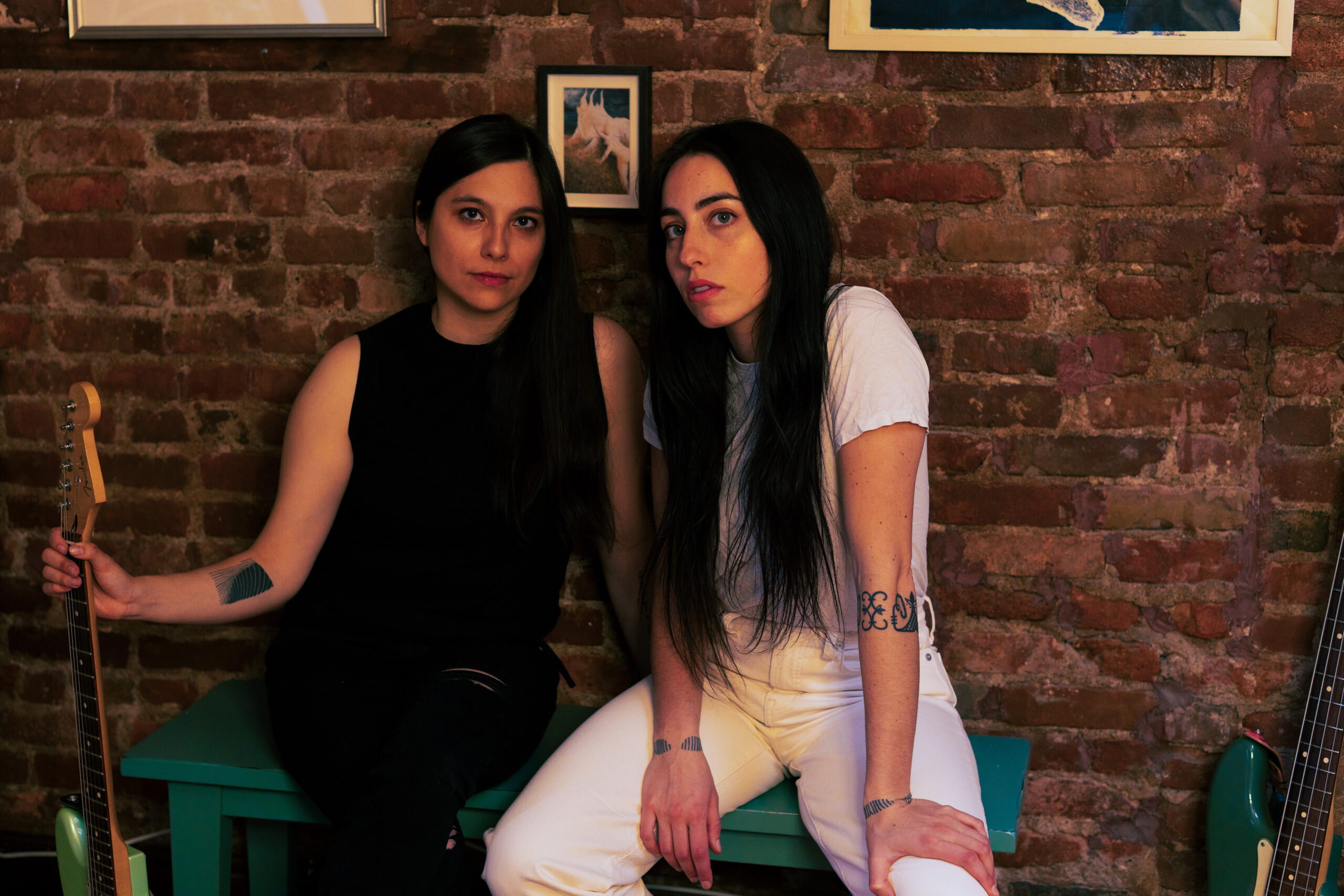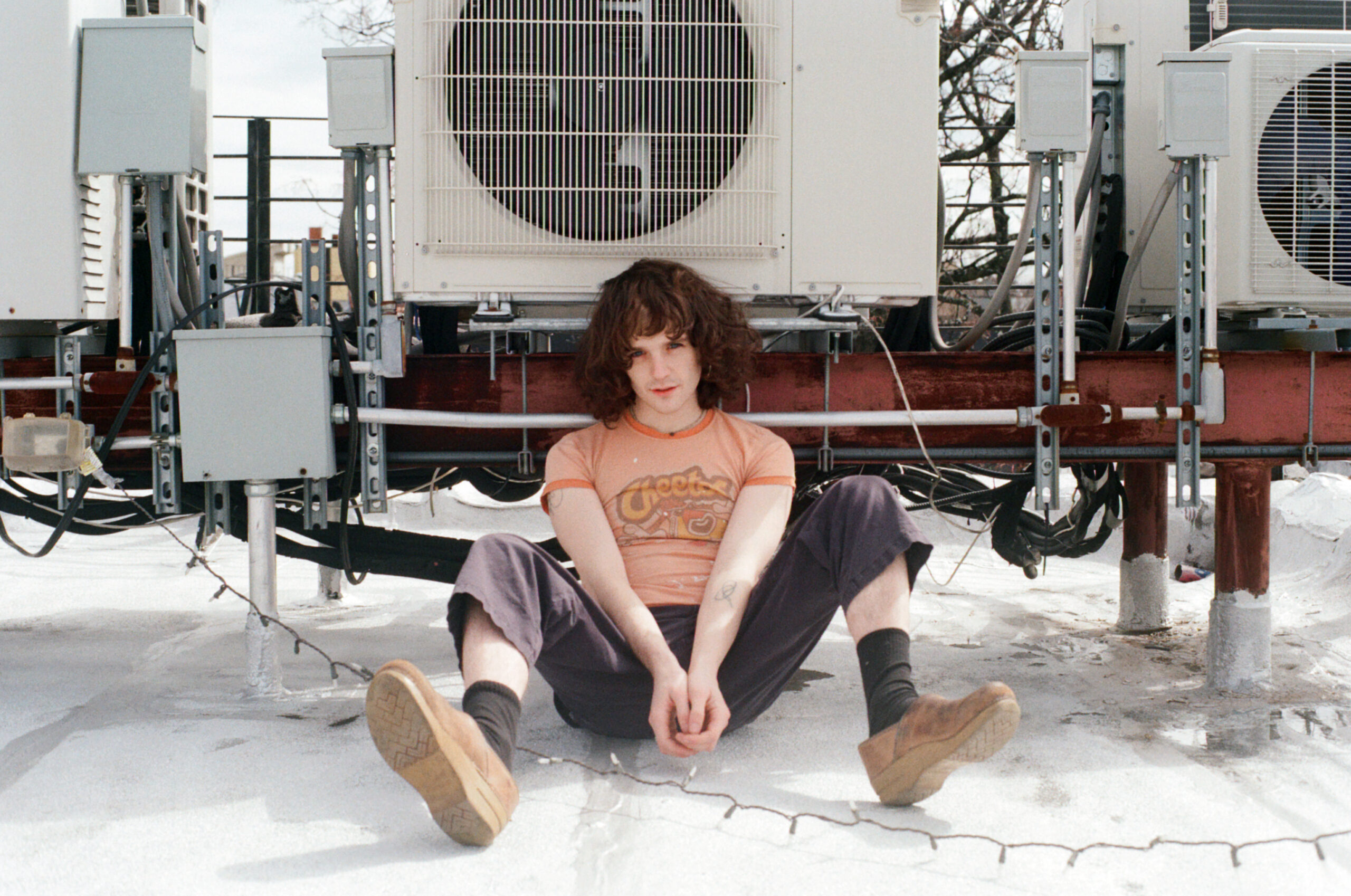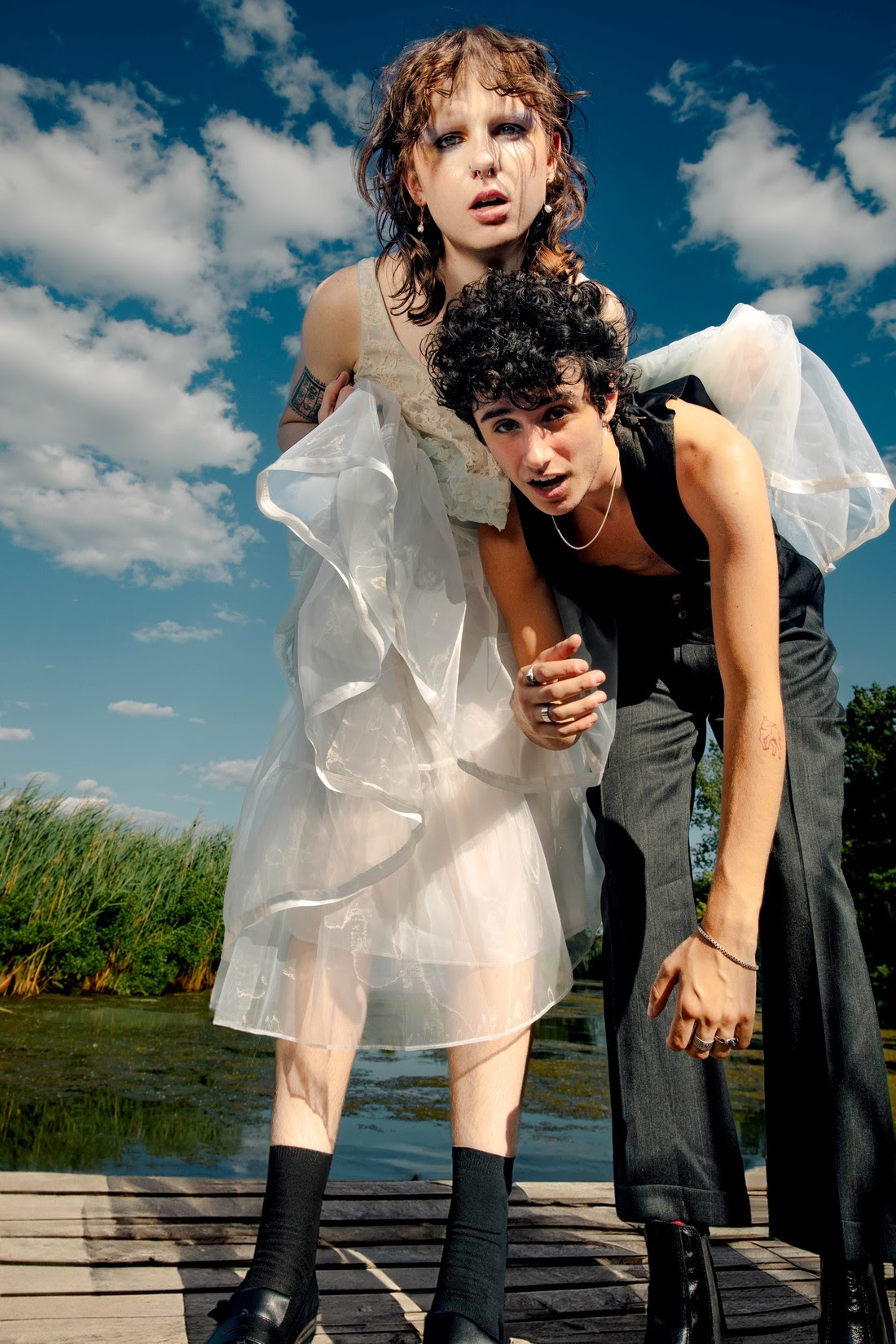Mali Obomsawin and Magdalena Abrego sound almost relieved to be playing in their new band, Deerlady. Though neither is a total stranger to the world of indie rock, they've both found success in recent years in other musical milieus. Obomsawin, a Berklee-trained bassist and composer, tours the jazz festival circuit as the leader of the Mali Obomsawin Sextet. In 2022, she released an acclaimed free jazz album called Sweet Tooth, which she sang entirely in the Abenaki language. Abrego also has a jazz background that runs through Berklee; she studied guitar performance there before moving on to the New England Conservatory of Music, where she'd eventually become a faculty member. On Greatest Hits, Deerlady's winkingly titled debut album, those biographies dissolve, and Obomsawin and Abrego tap into something more instinctive.
"Honestly, it just feels fucking great to be in a rock band," Obomsawin says with a laugh. "I feel like that's my natural state, and I have to put on my suit jacket and pretend to be a respectable grownup when I play in my jazz band."
"That's so real," Abrego echoes. "It's funny, because this one time I went to jazz camp, and after I played for the first time, a fellow camper was like, 'Who let this punk musician in here?' [laughs] And that is just my life in a nutshell. So, it feels like an unmasking."
Greatest Hits is a tough album to pin down. On its face, it sounds a bit like the moody, folky, neo-gothic work of singer-songwriters like Emma Ruth Rundle and Chelsea Wolfe, dotted with signifiers of shoegaze and slowcore instead of metal. It's also prone to blown-out, J Mascis-style guitar eruptions, which frequently emerge from moments of stark minimalism. There's a free-flowing quality to the songs, too, which surely comes from Obomsawin and Abrego's jazz training. But the album never feels like jazz. Ultimately, it doesn't really matter what you call it. Sharp songwriting tends to cut through noise about genre, and Deerlady's songs are the definite draw here.
Those songs are Obomsawin's — at least, the earliest versions of them were. She started working on the material that would become Greatest Hits in 2020, after her folk-rock band Lula Wiles imploded. Their breakup was precipitated, in part, by Obomsawin's growing discomfort in playing protest songs for complacent, mostly white audiences. Her new music, both for Deerlady and her free jazz project, would more directly reflect her experience as an indigenous person. (Obomsawin is a citizen of Odanak First Nation.) The Deerlady songs, especially, were driven by the incongruities she'd witnessed in Lula Wiles.
"I was thinking a lot about surrealism, as an art movement, but also lyrically, and as a concept that feels very applicable to living as a colonized person in America," she says. "Things are so surreal, all the time, and you're always kind of scratching your head being like, 'Is this what it looks like?' For me, that's the conceptual world that I wanted to build, sonically. I was really into the idea of musical things happening where the listener is like, 'Wait a second. Did that really happen? What was that? Let me go back and listen again.'"
To create those moments, Obomsawin knew she needed a guitarist who could push the songs to strange, daring places. A mutual collaborator recommended Abrego, whom Obomsawin had never met, despite the two circling each other in Boston jazz circles for years. "I had my friend say, 'I know this songwriter who's looking for a guitar player, and the vibe they're looking for is somebody who equally loves Charles Mingus and My Bloody Valentine,'" Abrego recalls. "Like, this is the perfect gig! This is the gig I've been waiting for."
The surreal sonic world that Obomsawin talks about wanting to create came into focus once Abrego was in the picture. The songs stayed anchored in Obomsawin's sturdy, dexterous bass lines and hushed vocals, but Abrego's guitar introduced an element of chance to the music. "Something we leaned into, in this kind of dreamlike space, was exploiting moments where the listener can't totally identify the source of the sound," Abrego says. "I've gotten several compliments on this record for parts that are not guitar parts. They're like, 'I love what you did there!' And I'm like, 'OK. Not a guitar.'"
Some of the record's most exciting moments are recognizably, undeniably guitar parts. A little more than halfway through "Masterpieces," Abrego rips a jagged, dissonant solo that seems to bubble up from the depths of the mix to swallow the song whole. When Obomsawin returns to sing the last repetition of the chorus, Abrego's guitar follows her vocal melody, and the two meet in a surprising, affecting duet. "Bounty" relies on the interplay between its quiet verses and the paroxysm of wailing guitar at its climax, while "Dedication" lets Abrego shred herself out of tune over its lush, densely layered outro.
"I think that those moments were really borne from an invitation from Mali to subsume the vocals," Abrego says. "As guitar players, we are so used to being told to turn down. And this was a cool moment where the singer was asking me to turn up, essentially. And so what that meant was that the hierarchy was shifted. I feel like, in a traditional rock band, we've got our lead person on vocals, and the band backing that person up. But it made it feel like the guitar could be foregrounded in a way that was a little bit subversive, in a way that I think is what we admire about a lot of shoegaze music."
The songs for Greatest Hits were finished by mid-2023, but Obomsawin and Abrego had no immediate plans to do anything with them. "I had very low expectations for anyone listening to it or giving a shit," Obomsawin says.
"When you listen to it over and over again for months, you're like, "This is the worst record I've ever put out,'" Abrego adds. "And I feel like we were in that space of like, 'Wait, do these songs low-key suck?'"
Amid that nadir of self-doubt, Obomsawin got a call from Reservation Dogs, the great FX series centered on four indigenous teenagers living in rural Oklahoma. The show wanted to license some music for a season three episode centered on the Deer Lady character. In addition to a handful of tracks from Sweet Tooth, Obomsawin gave them a then-unreleased version of "There There," which appears on Greatest Hits. "We didn't even have metadata out or anything, so when people were Shazaming on the show when they heard it, no one could find the band," Obomsawin laughs.
"There was a whole Reddit thread dedicated to discovering who had done this song on this episode of Rez Dogs," Abrego says. "We got all of this positive feedback, and we were like, 'Maybe we do release this.'"
We rely on reader subscriptions to deliver articles like the one you're reading. Become a member and help support independent media!
When Obomsawin and Abrego self-released Greatest Hits in January, they didn't even have a band name. ("We're Mali Obomsawin and Magdalena Abrego," Abrego deadpans. "It rolls off the tongue, easy to pronounce, fits on the marquee. Nailed it.") There wasn't a PR campaign for the album, either, but people were beginning to organically discover it through Obomsawin and Abrego's other work and from Reservation Dogs. Obomsawin decided to retroactively christen the band Deerlady, after being shocked to discover that the name wasn't already in use. It was a nod to the fateful Rez Dogs episode, but it also had a greater resonance for Obomsawin.
"That episode is somewhat of an origin story, at least for our public presence," she says. "But also, there's stories of Deer Lady in all kinds of Native communities, which is cool. She's a figure that shows up everywhere, and always has similar roles of making people accountable and giving you a teaching that will make you a better person, or something. My tribe has a Deer Lady story, too."
Obomsawin's role in Deerlady isn't to teach lessons, but the lessons are there for you if you're interested. When Greatest Hits came out, she said the lyrics were about intimacy under colonialism, but she now says they're just about intimacy because "'under colonialism' as a suffix is a little bit redundant." There's a line in "Masterpieces" that quotes the mission statement of the so-called Indian Residential Schools in the US and Canada, which cruelly wrested indigenous children from their homes to try to forcibly assimilate them. If you're not familiar with that dark chapter of colonial history, it's unlikely you'll pick up on the meaning of Obomsawin singing "save the man." If you know that the long version is "kill the Indian in him, and save the man," it hits like a truck.
"Lyrically, it's liberating to be like, 'Catch that if you can, but I'm not about to explain that shit,'" Obomsawin says. "Something that I really like about being in a rock band is you aren't expected to give a lecture, or to explain anything. In my jazz band, I think people really expect you to teach them, because you're there in an institution to do the thing."
Deerlady don't really play in places you'd call "institutions." Our interview took place the morning after they'd played a gig at the Lizard Lounge, an unassuming Cambridge bar that has shows in the basement. When they took the stage that night, they weren't jazz musicians, with all the cultural baggage that entails. But their muscle memory from years spent playing jazz was lurking just below the surface, and that experience is something they know they can bring to every Deerlady show.
"Last night, I was like, 'Magdalena, if I fuck up, it's gonna be obvious,'" Obomsawin told me that morning. "It's the least punk thing about me. I get so nervous before every show. And she was like, 'No, no. If you fuck up, I'm gonna decide to fuck up with you, and we'll just push it into a free section, and it'll be badass.' [laughs] To be able to do that, because we're so comfortable as improvisers, it feels very liberating."
"I'm so eager and excited to work on new music with Mali, because when we did Greatest Hits, we didn't know each other at all," Abrego says. "And now we've spent so much time together, creating and traveling, and I'm excited to know what that sounds like."

Greatest Hits is out now. Purchase it here.






